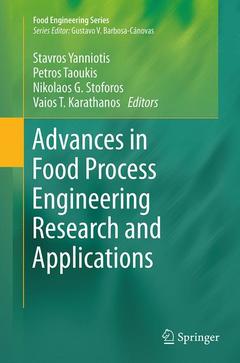Description
Advances in Food Process Engineering Research and Applications, 2013
Food Engineering Series
Coordinators: Yanniotis Stavros, Taoukis Petros, Stoforos Nikolaos G., Karathanos Vaios T.
Language: English
Subjects for Advances in Food Process Engineering Research and...:
Publication date: 08-2016
Support: Print on demand
Publication date: 10-2013
677 p. · 15.5x23.5 cm · Hardback
Description
/li>Contents
/li>Biography
/li>Comment
/li>
Stavros Yanniotis, Professor of Food Engineering at the Food Science & Technology Department, Agricultural University of Athens. He holds a Ph.D. and M.Sc. in Food Engineering from the Department of Food Engineering, University of Massachusetts and B.Sc. in Agricultural Engineering from the Agricultural University of Athens. He has been a faculty member of the Agricultural University of Athens since 1983 and Honorary Professor of the Czech University of Life Sciences in Prague since 2011. His research deals with the design and development of novel methods and systems for food processing and preservation with emphasis on heat and mass transfer, computer simulation, diffusion of water and various solutes in foods, functional foods, water activity and viscosity of foods as well as energy and water conservation in food processing.
Petros S. Taoukis, Diploma Chemical Engineer, National Technical University of Athens (NTUA) M.Sc., Ph.D. University of Minnesota, USA. Professor at the Laboratory of Food Chemistry and Technology, School of Chemical Engineering, NTUA. Scientific leader for NTUA in several European research projects. His research in food chemistry, kinetic modeling of food deterioration during and post processing, quality and shelf life predictive modeling, predictive microbiology, enzyme technology , high pressure processing, osmotic processing, intelligent packaging, and chill chain management is well cited.
Nikolaos G. Stoforos, a Chemical Engineer (National Technical University of Athens, 1978), is an Associate Professor in Food Preservation at the Department of Food Science and Technology, of Agricultural University of Athens, Greece. He holds a Ph.D. in Engineering (1988) and a Master of Science in Food Science (1984) from the Department of Biological and Agricultural Engineering, and the Department of Food Science and Technology at University of California, Davis, USA, respectively. Before his current position,

